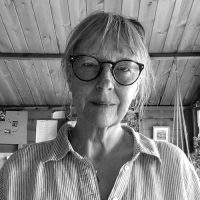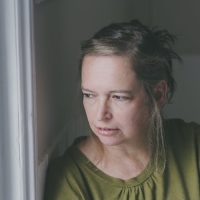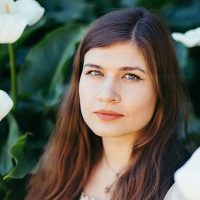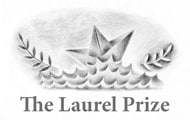UK Poet Laureate, Simon Armitage, and the Poetry School, are delighted to announce the winners of the annual nature and ecopoetry prize, The Laurel Prize. The prize is funded by Simon Armitage’s Laureate’s honorarium with individual donors and partners such as AAONB, and is run by the Poetry School. It is awarded for the best collection of environmental or nature poetry published that year. The winners – judged this year by the poets Glyn Maxwell (Chair), Elena Karina Byrne, and Tishani Doshi – are as follows:
First Prize: Linda France, The Knucklebone Floor (Smokestack Books)
Second Prize: Steve Ely, The European Eel (Longbarrow Press)
Third Prize: Jemma Borg, Wilder (Pavilion Books)
Best First Collection: Cynthia Miller, Honorifics (Nine Arches Press)
Best International First Collection: Rebecca Hawkes, Meat Lovers (Auckland University Press)
The prize awards £5,000 (1st prize), £2,000 (2nd prize), and £1,000 (3rd prize). There’s also a £500 for Best First Collection and £500 for International Best First Collection. In addition, each of the winners will receive a commission from the AAONB to create a poem based on their favourite landscape.
FIRST PRIZE: Linda France
 Linda France has published nine poetry collections, including The Gentleness of the Very Tall (Bloodaxe 1994), Reading the Flowers (Arc 2016) – longlisted for the inaugural Laurel Prize – and her most recent, The Knucklebone Floor (Smokestack 2022). Among various awards and prizes, she won the Poetry Society’s National Poetry Competition in 2013 and has received a Society of Authors’ Cholmondeley Award. She is currently Climate Writer in residence with New Writing North and Newcastle University.
Linda France has published nine poetry collections, including The Gentleness of the Very Tall (Bloodaxe 1994), Reading the Flowers (Arc 2016) – longlisted for the inaugural Laurel Prize – and her most recent, The Knucklebone Floor (Smokestack 2022). Among various awards and prizes, she won the Poetry Society’s National Poetry Competition in 2013 and has received a Society of Authors’ Cholmondeley Award. She is currently Climate Writer in residence with New Writing North and Newcastle University.
SECOND PRIZE: Steve Ely
 Steve Ely has published several books or pamphlets of poetry, including Oswald’s Book of Hours, Englaland, Zi-Zi Taah Taah Taah: The Song of the Willow Tit, Lectio Violant and The European Eel. His work has been nominated for the Forward Prize for Best First Collection and the Ted Hughes Prize for New Work in Poetry. In 2015 he won the Northern Writers’ Award for Poetry for Incendium Amoris. He has also published a novel, Ratmen, and a biographical work, Ted Hughes’s South Yorkshire: Made in Mexborough. He’s previously worked as a dairyman, labourer, fork-lift truck driver and secondary school teacher, but since 2015 he has lectured in Creative Writing at the University of Huddersfield, where he is also Director of the Ted Hughes Network.
Steve Ely has published several books or pamphlets of poetry, including Oswald’s Book of Hours, Englaland, Zi-Zi Taah Taah Taah: The Song of the Willow Tit, Lectio Violant and The European Eel. His work has been nominated for the Forward Prize for Best First Collection and the Ted Hughes Prize for New Work in Poetry. In 2015 he won the Northern Writers’ Award for Poetry for Incendium Amoris. He has also published a novel, Ratmen, and a biographical work, Ted Hughes’s South Yorkshire: Made in Mexborough. He’s previously worked as a dairyman, labourer, fork-lift truck driver and secondary school teacher, but since 2015 he has lectured in Creative Writing at the University of Huddersfield, where he is also Director of the Ted Hughes Network.
THIRD PRIZE: Jemma Borg
 Jemma Borg won the inaugural Ginkgo Prize in 2018 and The Rialto/RSPB Nature and Place Competition in 2017. Recent publications include the TLS, The Poetry Review and Oxford Poetry, and anthologies such as Out of Time (Valley Press 2021) and Places of Poetry (Oneworld 2020), and her first collection, The illuminated world (Eyewear, 2014), won the Fledgling Award and the New Writing Ventures Award for Poetry. She was a zoologist and evolutionary geneticist before working in scientific research management in the voluntary sector and in science publishing.
Jemma Borg won the inaugural Ginkgo Prize in 2018 and The Rialto/RSPB Nature and Place Competition in 2017. Recent publications include the TLS, The Poetry Review and Oxford Poetry, and anthologies such as Out of Time (Valley Press 2021) and Places of Poetry (Oneworld 2020), and her first collection, The illuminated world (Eyewear, 2014), won the Fledgling Award and the New Writing Ventures Award for Poetry. She was a zoologist and evolutionary geneticist before working in scientific research management in the voluntary sector and in science publishing.
BEST FIRST COLLECTION: Cynthia Miller
 Cynthia Miller is a Malaysian-American poet, festival producer and innovation consultant living in Edinburgh. Her poems have appeared in Ambit, The Rialto, Butcher’s Dog, Poetry Birmingham Literary Journal, harana poetry, The Best New British and Irish Poets and Primers Volume Two. She is also Co-Founder of the Verve Poetry Festival.
Cynthia Miller is a Malaysian-American poet, festival producer and innovation consultant living in Edinburgh. Her poems have appeared in Ambit, The Rialto, Butcher’s Dog, Poetry Birmingham Literary Journal, harana poetry, The Best New British and Irish Poets and Primers Volume Two. She is also Co-Founder of the Verve Poetry Festival.
BEST INTERNATIONAL FIRST COLLECTION: Rebecca Hawkes
 Rebecca Hawkes is a poet/painter/public servant from Aotearoa New Zealand. Raised on a sheep and beef farm nestled in the Southern Alps, she now maintains a tenuous work/work balance in the capital city Wellington. Her first book, Meat Lovers, was unleashed by Auckland University Press in 2022. Rebecca is an editor for literary journal Sweet Mammalian and the recently released No Other Place to Stand: An Anthology of Climate Change Poetry from Aotearoa New Zealand (Auckland University Press, 2022). She dotes on her carnivorous pitcher plants and won the 2021 Philip Booth Poetry Prize (Salt Hill Journal, Syracuse) with a gory ode to their gluttony.
Rebecca Hawkes is a poet/painter/public servant from Aotearoa New Zealand. Raised on a sheep and beef farm nestled in the Southern Alps, she now maintains a tenuous work/work balance in the capital city Wellington. Her first book, Meat Lovers, was unleashed by Auckland University Press in 2022. Rebecca is an editor for literary journal Sweet Mammalian and the recently released No Other Place to Stand: An Anthology of Climate Change Poetry from Aotearoa New Zealand (Auckland University Press, 2022). She dotes on her carnivorous pitcher plants and won the 2021 Philip Booth Poetry Prize (Salt Hill Journal, Syracuse) with a gory ode to their gluttony.
2022 Longlist
UK Poet Laureate, Simon Armitage, and the Poetry School, are delighted to announce the longlist for the third year of nature and ecopoetry collection award – The Laurel Prize. Simon generously donates the £5,000 honorarium he receives annually from the Queen to fund the First Prize. Run by the Poetry School, the prize is awarded annually for the best published collection of environmental or nature poetry. This year the Prize opened to submissions in the English language from poets globally and the list reflects this. The longlist, which was judged this year by the poets Glyn Maxwell (Chair) and Elena Karina Byrne and Tishani Doshi, is as follows (in no particular order):
Polly Atkin, Much with Body (Seren Books)
Emily Berry, Unexhausted Time (Faber & Faber)
Jemma Borg, Wilder (Pavilion Books)
Steve Ely, The European Eel (Longbarrow Press)
Forrest Gander, Your Nearness (Arc Publications)
Linda France, The Knucklebone Floor (Smokestack Books)
Helen Hajnoczky, Frost and Pollen (Invisible Publishing)
Rebecca Hawkes, Meat Lovers (Auckland University Press)
Sylvia Legris, Garden Physic (Granta)
Alice Miller, What Fire (Pavilion Poetry)
Cynthia Miller, Honorifics (Nine Arches Press)
Caleb Parkin, This Fruiting Body (Nine Arches Press)
Sumana Roy, V.I.P (Shearsman Books)
Penelope Shuttle, Lyonesse (Bloodaxe Books)
Stephanie Sy-Quia, Amnion (Granta)
Mark Totterdell, Mollusc (The High Window Press)
Katharine Towers, Oak (Picador)
Jack Underwood, A Year in the New Life (Faber & Faber)
Sarah Watkinson, Photovoltaic (Graft Poetry)
Sarah Westcott, Bloom (Pavilion Poetry)
The prize awards
£5,000
(1st Prize)
£2,000
(2nd Prize)
£1,000
(3rd Prize)
There’s also a £500 for Best First Collection and £500 for International Best First Collection. In addition, each of the winners will receive a commission from the AAONB to create a poem based on their favourite landscape.

